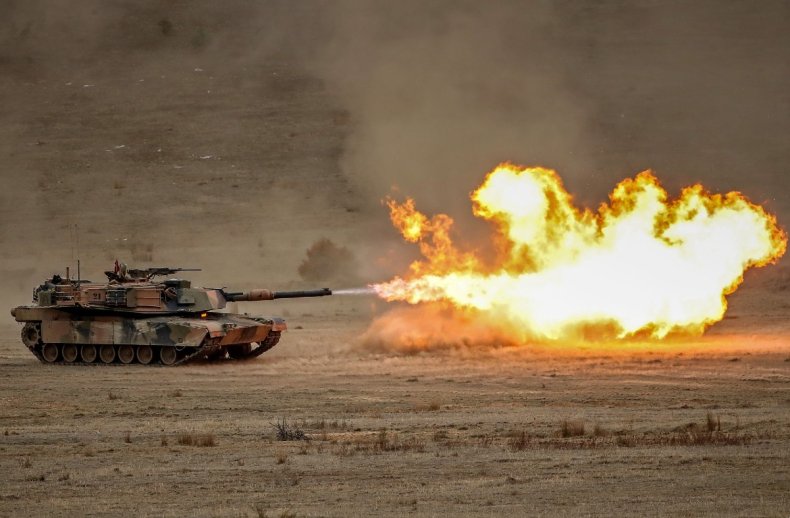ELLIE COOK
U.S.-made M1 Abrams tanks will be a "valuable addition" to Ukraine's military as Kyiv presses on with its counteroffensive, although doubts remain over just how much of a difference the long-awaited hardware will make at the front lines.
Although the arrival of the Abrams "will add a little more punch to Ukraine's counteroffensive," they will only be effective if Ukraine wields them alongside well-executed, combined-arms tactics, defense writer and military expert Michael Peck told Newsweek.
"While the Abrams is a valuable addition for Ukraine, 31 vehicles aren't enough to significantly affect the war," he added.
Some experts are more skeptical about the advantages Ukraine will gain in integrating yet another type of tank into its forces heading into the tougher months of the year.
"In military terms, I think there are more issues than advantages," Marina Miron, a post-doctoral researcher in the War Studies Department at King's College, London, U.K., told Newsweek.
On Tuesday, U.S. Defense Secretary Lloyd Austin said the U.S. military's Abrams tanks would be arriving in Ukraine soon, and that they would "add another formidable armored capability to join the Leopards that are already on the battlefield."
The U.S. pledged a total of 31 Abrams tanks in late January, as several of Kyiv's Western allies committed main battle tanks like the Leopard 2 and the Challenger 2. These have already arrived in Ukraine, unlike the Abrams. In mid-March, the Pentagon said it would not be sending later-generation M1A2 Abrams, but refurbished M1A1 tanks.

An M1 Abrams main battle tank fires during Exercise Chong Ju at the Puckapunyal Military Area on May 9, 2019, in Seymour, Australia. U.S. M1 Abrams tanks will be a "valuable addition" to Ukraine's military as Kyiv presses on with its counteroffensive.
These older tanks would nonetheless have "a very similar capability" to the later M1A2, Pentagon press secretary, Brigadier General Pat Ryder, said. "This is about getting this important combat capability into the hands of the Ukrainians sooner rather than later," he added.
Heading into the fall and winter months of Ukraine's high-cost, grueling counteroffensive, there are several things Ukraine's military will need to consider with their new M1 Abrams, experts suggest.
Their impact will likely be dictated by the weather conditions along the front lines. With the fairer summer weather slipping away, Ukraine's forces will stare down the country's muddy season, also known as rasputitsa—literally "the season of bad roads."
The Abrams have seen most action under relatively dry conditions, unlike those heading for Ukraine in the coming months, Peck said.
"It will be interesting to see how it performs during intensive mechanized combat operations in mud and snow, in a region with lots of streams and rivers," he added.
But Ukraine shows no signs of stopping. "In the cold, wet and mud, it is more difficult to fight," Major General Kyrylo Budanov, the head of Ukraine's military intelligence agency, said earlier this month. However, "fighting will continue, the counteroffensive will continue," he stressed.
Although Ukraine's summer campaign has focused on the southern Zaporizhzhia region, Kyiv has reclaimed two villages in the eastern Donetsk region close to the decimated city of Bakhmut, Ukrainian officials said in the past week.
Zaporizhzhia yielded Ukraine's first breakthrough of the high-casualty campaign after months of pushing against well-fortified Russian defenses. Earlier this month, Ukraine said it was now between the first and second lines of defenses around the town of Robotyne, south of the Ukrainian-held city of Orikhiv.
Ukraine will hope to use the new Abrams tanks to continue its push southward, first to the Russian-controlled city of Tokmak, then onto Melitopol and, ultimately, to the Sea of Azov.
"Using them in Zaporizhzhia would be less than logical with the rainy season starting, given that these tanks can get stuck in the mud," Miron argued, adding: "The support vehicle can also get stuck, which would be detrimental."
Ukraine must now also consider having three different types of unfamiliar Western main battle tanks in the mix.
"Using three kinds of tanks in places like Zaporizhzhia creates a logistical nightmare," Miron said. It will strain Ukraine's logistics, which Russia will be trying to target, she continued and, if successful, Moscow's forces could render the Abrams, Challenger or Leopard tanks donated by Kyiv's Western allies "useless."
Potential pitfalls also crop up with the maintenance of the Abrams, she added. Ukraine's forces will need to be able to get hold of spare parts, and engineers able to use them, for the different versions, as well as being confident enough in the training on the "much more sophisticated" tanks to use them properly, Miron said.
"Another issue with M1 is that it uses a lot of fuel, so it can move only as fast as fuel trucks," she added.
Soon after the U.S. pledged Abrams tanks, analysts suggested that the "fuel hog" Abrams—which runs on jet fuel—could throw up several issues for Ukraine.
"There's a specific type of fuel that powers the Abrams, and we've got to make sure that pipeline—literally and figuratively—is available to Ukraine," White House national security council spokesperson, John Kirby, said in late January.
Yet another consideration is the ammunition Ukraine will need for such a broad range of tanks.
"Not all of them use the same ammo, and there is a shortage," Miron said. "So, if the Ukrainian military does not get the necessary quantities of ammunition, it will undermine the usefulness of M1s (or any other tanks)."
The tanks, once they arrive, will also have to contend with the Russian defenses Ukraine has been grappling with since early June.
It is hard to tell how the Abrams will fare against Russian mines and dragon's teeth, Miron said. Moscow's forces have "plenty of anti-tank weapons and anti-tank mines that have already inflicted losses on Ukraine's Western-supplied armor" like the German-made Leopard tanks and the U.S.-made Bradley fighting vehicle, Peck added.
No comments:
Post a Comment